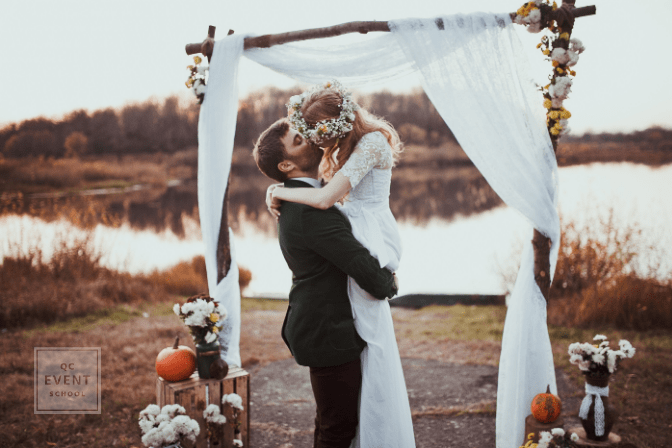
Distinguishing Your Role: Wedding Planner vs. On-Site Venue Coordinator – Part 2
In Part One of our series, we examined the role of an on-site venue coordinator. In particular, we looked at what’s involved in their job description, as well as the limitations posed to clients.
Today, we’ll turn our focus to your role as a certified wedding planner.
What is a Wedding Planner?
As the title suggests, a certified wedding planner is a planning industry professional who (ideally) has earned their wedding planner certification. They’ve gained invaluable schooling and training, and are considered to be experts in the world of wedding organization.
Quite literally, a wedding planner is someone who assists clients with planning and executing their wedding day. But this is a major simplification! In reality, the wedding planning process is a long, extensive endeavor. A wedding planner’s tasks and responsibilities go far beyond what occurs on the day of the event itself.
The wedding planner’s job begins long before the big day!
What Can a Wedding Planner Do for Clients?
When it comes to putting together a wedding, a certified planner can assist clients with practically anything! It really depends on the client’s needs and budget.
If we were to name off ALL of a wedding planner’s typical responsibilities, we’d be here all day. But to give you an idea, here are a handful of regular tasks you’d be expected to take care of:
- Having an initial consultation with the client
- Determining the client’s budget, working within it, helping to lower costs and save money, etc.
- Researching and securing vendors and suppliers (i.e. florists, makeup artists, hair stylists, caterers, DJs, etc.)
- Researching and securing an officiant, priest, etc. to perform the ceremony
- Researching and securing a venue for the wedding and reception to take place in
- Assisting with Save the Dates, invitations, Thank You cards, etc.
- Helping the bride find her perfect dress
- Scheduling cake tastings
- Assisting with speech and toast writing (or helping secure a professional to assist with this, if requested)
- Working with the wedding party, family of the couple, etc.
- Assisting with event decor, or securing a trained event decorator
- Using your knowledge of the client to help create a more personalized experience
- Formulating timelines and schedules, managing others to abide by their deadlines, etc.
- Handling payments and making sure deadlines are met with vendors, suppliers, the venue, etc.
- Organizing a wedding and/or dinner rehearsal, if requested
- Making sure everything runs smoothly and stays on-schedule on the big day
- And much more!
What a Wedding Planner Can’t Do
A wedding planner is in charge of most tasks related to organizing a wedding. But of course, there are still some things that a planner can’t do.
For instance, they can only have so much control over third parties (such as vendors, suppliers, and the venue). Yes, they can work with these people and manage things to the best of their ability. But ultimately, vendors are separate businesses. This means that all the planning in the world might be able to prevent an unexpected setback.
Sometimes, a vendor or supplier won’t show up on the big day, or may run late. The venue may accidentally mess something up, such as the number of chairs at the reception. The caterer may mix up a guest’s menu selection. The weather may not cooperate. You get the idea.
The most important thing is that the wedding planner knows how to respond in the face of any unexpected hiccups. A knowledgeable planner, who’s taken the time to earn their wedding planner certification, is going to know how to remain calm and collected in a time of crisis. They’ll have contingency plans ready to go.
How to Distinguish Your Role as a Wedding Planner
When first meeting with your client, ensure to take the time to answer any and all questions they have about the planning process. Explain what you do and the services you can provide them. If there are certain things you can’t assist with, make them known. The whole experience will be better for everyone involved if there’s complete and total transparency about what to expect.
A great way to preemptively handle this is through your marketing strategies. Your professional website can do a great job of answering many of the questions they may have, so that they don’t have to ask them during the consultation.
Above all else, make sure your client knows that your main priority is THEM! After all, that is what a wedding planner does. They put the client first, by doing everything in their power to make the overall experience as positive and stress-free as possible. So, get to know your client. Show you care, and that you’re dedicated to their big day.
So long as you drive this point home, you’ll have no problem booking a long list of happy customers!




